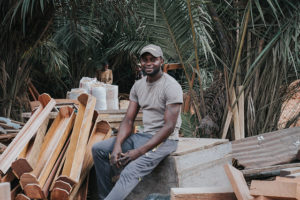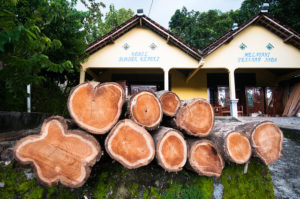
A growing number of investors want to have a greater positive impact on people’s rights and livelihoods in areas where they do business.
Tropenbos International (TBI), one of the CGIAR Research Program on Forests, Trees and Agroforestry’s (FTA) partner institutions, held on Sept. 14 a workshop titled Towards inclusive investment and business models for improved land governance and livelihoods: Are we on the right track? in Ede, the Netherlands.
Part of a broader series of annual seminars on sustainable forest management in the tropics, the event brought together finance, business, land use and development experts to address how to work with smallholders and learn from existing business cases.
Amid cases in which large-scale agricultural investments have damaged local livelihoods and ignored biodiversity and traditions, international organizations have established guidelines to help mitigate the adverse effects of investments. However, a growing number of businesses and investors want to exceed such guidelines, aiming for a positive impact on local communities’ livelihoods and tenure rights through their investments.

“A growing number of investors aspire to make the transition from ‘doing no harm’ toward ‘doing good’,” TBI director René Boot said in opening the seminar. “The positive news is that this can be done.”
The discussions not only raised awareness on the importance of moving from the do-no-harm to the do-good approach in investing in smallholder land management, but also provided evidence of the feasibility and scaling-up opportunities from such an approach.
Participants shared experiences on best practices and made recommendations on strategies, mechanisms and follow-up actions to enhance investment in inclusive business models that improve the livelihoods, land security and entrepreneurial potential of smallholders.
Read more: Attention to detail is necessary for zero deforestation intentions to succeed, say scientists
Furthermore, the seminar contributed to the improvement of a working paper titled “Improving the positive impacts of investments on smallholder livelihoods and the landscapes they live in.”
Discussions on the paper covered ways for investors to improve the positive benefits of their investments, namely recognizing rights, effectively engaging, and the need to “think landscape.”
The findings of the seminar indicated that by recognizing local practices, as well as working with local communities, investors can benefit from greater local support. The findings also stated that understanding on a landscape scale could lead to production diversification and improved local food security.
The seminar, which was organized by TBI and other organizations working in the Netherlands, can be seen as a precursor to future work that TBI will carry out as part of FTA’s research theme on sustainable value chains and investments to support forest conservation and equitable development.

Key scientists intend to build upon the body of work under FTA in order to make explicit the connections between responsible financing schemes and the development of inclusive business models, as part of the conditions needed to support more sustainable landscapes.
“The approach undertaken by TBI constitutes a key piece in building financing schemes that can contribute more positively to business models that work for the environment and smallholders, supporting broader agendas on sustainability and inclusivity,” said FTA Flagship 3 leader Pablo Pacheco.
“The research on value chains and finance in FTA will continue building in these innovative approaches,” he added.
Read more: Sustainable value chains and investments
“At TBI, we see the report and the seminar – and all the preliminary work – as an important contribution to FTA research and engagement work, in advancing the agenda for it, and on which to base further collaborative activities, particularly in the field of inclusive business and finance,” said TBI program coordinator Herman Savenije.
“We see this topic of inclusive finance and business as an important one in which we can learn a lot by actively engaging with those worlds. In the Netherlands I feel the thinking in the finance and business worlds on inclusiveness has advanced somewhat, though still with some frontrunners, and we have started building networks with them,” he added.
The day of presentations from nine speakers yielded numerous insights and ideas – including that scaling up is easier if one can show clear profits; that there is a clear ‘missing middle’ between small and large investments; and that transparency is vital – many of which are contained in the summary report.
Evidently, research on investments for improved land governance and livelihoods, which will be built upon by TBI and other institutions as part of FTA, is indeed on the right track.
By Hannah Maddison-Harris, FTA Editorial and Communication Coordinator
This work is linked to the CGIAR Research Program on Forests, Trees and Agroforestry, which is supported by CGIAR Fund Donors.











